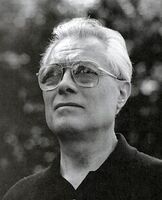Oberhammer, G.: Difference between revisions
m (1 revision imported) |
m (Text replacement - "{{Footer}}" to "") |
||
| (2 intermediate revisions by one other user not shown) | |||
| Line 1: | Line 1: | ||
{{Person | |||
|MainNamePhon=Gerard Oberhammer | |||
|SortName=Oberhammer, Gerard | |||
|namefirst=Gerard | |||
|namelast=Oberhammer | |||
|PersonType=Editors; Professors | |||
|bio=Gerhard Oberhammer (born 1929) studied theology and philosophy in Innsbruck before he turned his attention to Indology. In 1964 he succeeded Erich Frauwallner (1898–1974) as head of the Institute for Indology at the University of Vienna. He held this professorship until his retirement in 1997. His first co-operation with the ÖAW took place in 1970, when Oberhammer, with the support of Cardinal Franz König and the Academy, founded the De Nobili Research Library, which is now located at the ISTB of the University of Vienna on permanent loan from the ÖAW. From 1983 Oberhammer oversaw the "Commission for Languages and Cultures of South and East Asia," founded by Frauwallner, as well as the "Research Unit for Cultural and Intellectual History of Asia" that had been formed in 1986. The two units merged into an institute (the IKGA) in 1991, with Oberhammer serving as its director until his retirement in 1997. | |||
The most important projects conducted or initiated at the Institute under Oberhammer's directorship include: | |||
* Dictionary of Indian Epistemology and Logic (1983–2006), with the co-operation of Ernst Prets and Joachim Prandstätter. | |||
*The Tāntrikābhidhānakośa Project: A Hindu Tantric Dictionary (since 1993), with the co-operation of Marion Rastelli. | |||
*History of the Rāmānuja School (1994–2010), with the co-operation of Marcus Schmücker and Marion Rastelli. This project led to the work on the Viṣṇu philosopher Veṅkaṭanātha (traditionally dated 1270-1369), which remains a key topic at the IKGA. | |||
*Hermeneutics of religion, an interdisciplinary research topic that highlights in particular the encounter of and the dialogue between western and eastern religions. ([https://www.oeaw.ac.at/en/ikga/institute/former-directors Source Accesed Jan 30, 2024]) | |||
|images=File:Oberhammer Gerard.jpg | |||
|yearbirth=1929 | |||
|classification=People | |||
}} | |||
== Full Name == | == Full Name == | ||
[[Gerhard Oberhammer]] [[Oberhammer, Gerhard]] | [[Gerhard Oberhammer]] [[Oberhammer, Gerhard]] | ||
| Line 13: | Line 33: | ||
== Publications == | == Publications == | ||
Latest revision as of 14:39, 5 June 2024
| PersonType | Category:Editors Category:Professors |
|---|---|
| FirstName / namefirst | Gerard |
| LastName / namelast | Oberhammer |
| MainNamePhon | Gerard Oberhammer |
| SortName | Oberhammer, Gerard |
| bio | Gerhard Oberhammer (born 1929) studied theology and philosophy in Innsbruck before he turned his attention to Indology. In 1964 he succeeded Erich Frauwallner (1898–1974) as head of the Institute for Indology at the University of Vienna. He held this professorship until his retirement in 1997. His first co-operation with the ÖAW took place in 1970, when Oberhammer, with the support of Cardinal Franz König and the Academy, founded the De Nobili Research Library, which is now located at the ISTB of the University of Vienna on permanent loan from the ÖAW. From 1983 Oberhammer oversaw the "Commission for Languages and Cultures of South and East Asia," founded by Frauwallner, as well as the "Research Unit for Cultural and Intellectual History of Asia" that had been formed in 1986. The two units merged into an institute (the IKGA) in 1991, with Oberhammer serving as its director until his retirement in 1997.
The most important projects conducted or initiated at the Institute under Oberhammer's directorship include:
|
| YearBirth | 1929 |
| Other wikis |
If the page does not yet exist on the remote wiki, you can paste the tag |
Full Name
Gerhard Oberhammer Oberhammer, Gerhard
Affiliation
Gerhard Oberhammer (* 1929 in Innsbruck[1]) ist ein österreichischer emeritierter ordentlicher Universitätsprofessor für Indologie an der Universität Wien. Er leitete das Institut dieser Universität von 1983 bis zu seiner Emeritierung 1997, ist Autor zahlreicher Publikationen und wirkliches Mitglied der philosophisch-historischen Klasse der Österreichischen Akademie der Wissenschaften. Source Accessed November 29, 2011

